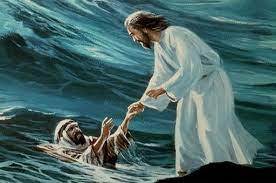
For the four weeks leading up to and going beyond Easter, let’s take a look at the life of Peter. Because he’s so often at the center of both the brightest and darkest moments in the Gospels, he has always been a source of hope and inspiration for those endeavoring to follow Jesus.
“But when he saw the wind, he was afraid” (Matthew 14:30).
Over the years, countless sermons have taken shots at Peter. They usually include lines like this: “He bravely stepped out of the boat and began walking. But then he took his eyes off Jesus – that was his big mistake! – and began to focus on his circumstances. Thus the poor man began to sink.” This observation implies that the preacher, under the same circumstances, would never have gotten his ankles wet.
Let’s do a reality check. There isn’t a preacher in the world who has ever done what Peter did. Peter actually walked on water.
When the day comes that you finally get to be a contestant on Who Wants to Be a Millionaire, and the final question is, “According to the Bible, how many people have walked on water?” please remember that the answer is two. Jesus and Peter both walked on the Sea of Galilee.
Peter may not have walked a mile, but exactly how many steps have any of us taken?
It’s easy to relate to Peter’s surge of fear. Taking a giant step for God – making a personal decision that takes me well out of my comfort zone – does not automatically eliminate that all-too-human response. In his book If You Want to Walk on Water, You Have to Get Out of the Boat, John Ortberg devotes an entire chapter to the fact that faith and fear go together like macaroni and cheese.
Columnist Dave Barry observes, “All of us are born with a set of instinctive fears: of falling, of the dark, of lobsters, of falling on lobsters in the dark, of speaking before a Rotary Club, and of the words, ‘some assembly required.’” Ortberg recounts the story of a friend who was terrified just thinking about having a conversation with an intimidating person. He said to his wife, “My hands are getting wet.” A while later he noted, “Now my mouth is getting dry.” His wife came up with the perfect solution: “Why don’t you just lick your hands?”
The issue isn’t whether we are afraid. All of us face fears. The issue is whether or not we will give fear the permission to write the next chapter of our lives.
Fear is the number one reason that people struggle to obey God. Our theology may be spot on. In our heads we may know that we serve a God who will meet all our needs. But when it’s time to walk away from the job that is paying our bills but deceiving our customers; when it’s way past time to abandon a soul-crushing addiction; when the moment has arrived to go out on a limb and be lavishly generous with our money, we hesitate. We see the waves and the wind, and we remember reading somewhere that the Sea of Galilee is 140 feet deep.
When fear is granted the upper hand, for all intents and purposes we become atheists. We live as if God isn’t even there.
What does Jesus say about this?
As he approaches the disciples’ boat during the fourth watch (approximately 3:00 am), he says something amazing: “Take courage! I AM. Don’t be afraid” (Matthew 14:27).
A number of English Bible translations render that verse somewhat differently: “Take courage! It is I.” But in the Greek, Jesus literally says, “I AM.” There’s no way this is accidental or incidental. “I AM” is how God identifies himself in the Old Testament. God tells Moses that his personal name is Yahweh, which means essentially, “I am who I am.”
In the middle of the storm, Jesus is telling us who he is. He is declaring why he can be trusted. He is God – the God who rules the cosmos, the winds, and the waves.
“I AM” is the God who has final authority over your looming MRI, your impending final exams, your disagreeable boss, your confidence-shattering bank statement, and your grown child who just said she never wants to see you again.
How are we going to confront the fears that keep us from obeying God? The answer is to learn from experience that Jesus is who he claims to be. That will require a series of steps and failures, steps and failures. Like Peter, we will sometimes find ourselves sinking beneath the waves. And like Peter, we will cry out for help. But also like Peter, we will live to (try to) trust Jesus again.
Personally experiencing God’s provision is the fundamental way to grasp that our Lord will not let us down.
One way or the other, our lives are being changed – either by trusting God or by not trusting God.
After Jesus rescues Peter and returns him to the boat, Matthew adds this final line: “They worshiped him, saying, ‘Truly you are the Son of God.’” But which of the disciples know by experience that Jesus is the Son of God? Not the boat potatoes. Peter alone knows the degree to which Jesus can be trusted – because Peter alone courageously submitted his faith to a real-world stress test.
What about Jesus’ very public reprimand? He asks Peter, “Why didn’t you keep trusting?”
Only the athlete in training hears the harshest words from the coach – words that will shape what happens tomorrow. Notice that Jesus has nothing to say to anyone else in the boat. That’s because they didn’t go out for the team.
Peter may have put himself in a position to fail.
But he also gave himself a matchless opportunity to grow.
By God’s grace, may we do the same this weekend.
